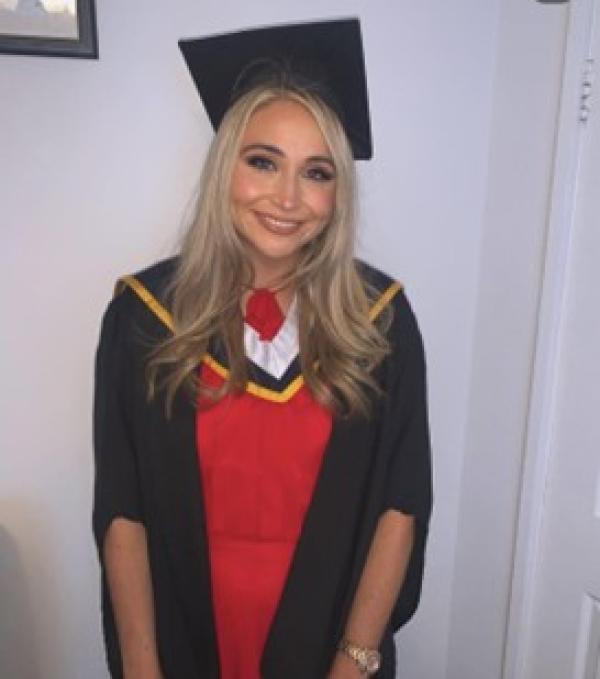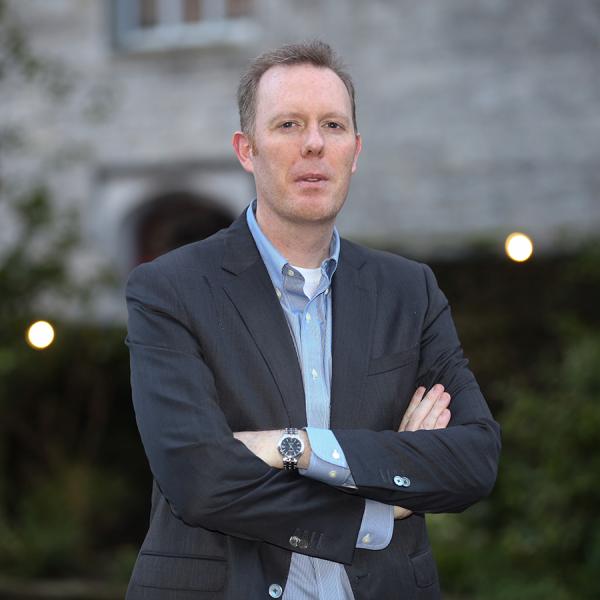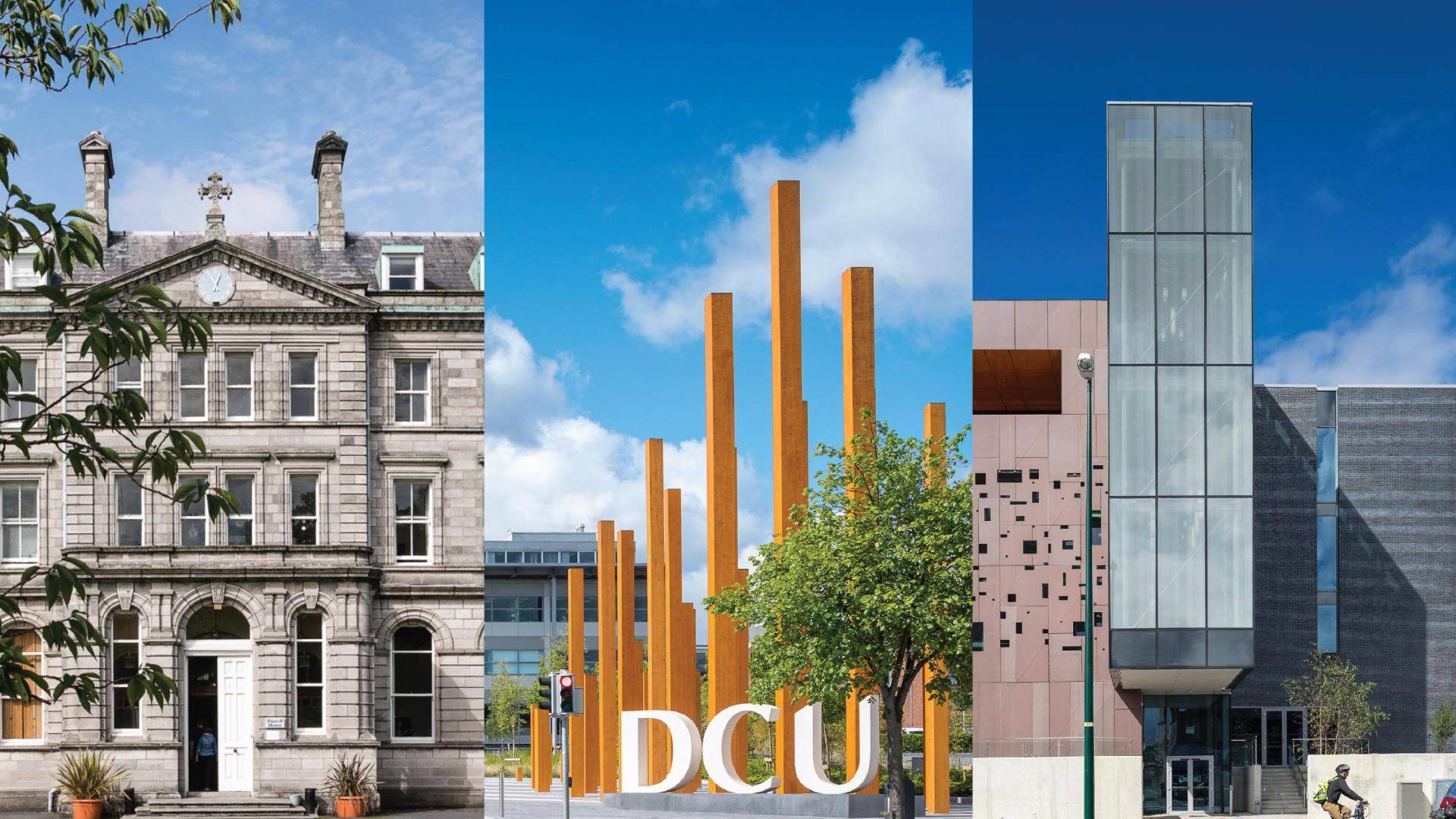Overview
Is cúrsa nuálach comhaimseartha é an MA i Léann na Gaeilge ina soláthraítear deis do mhic léinn sainscileanna acadúla a ghnóthú trí iniúchadh níos doimhne a dhéanamh ar theanga, ar chultúr, agus ar litríocht na Gaeilge.
Tabharfar deis duit do chumas taighde agus anailíse a fheabhsú trí réimse scileanna taighde a shealbhú agus trí dhul i ngleic le foinsí eolais agus critice éagsúla.
Scoil ildisciplíneach is ea Fiontar & Scoil na Gaeilge atá aitheanta go hidirnáisiúnta ar chaighdeán an taighde atá ar bun ag an bhfoireann acadúil agus ag foireann na dtionscadal digiteach. Reachtáiltear an clár ar bhonn éilimh agus déantar é a theagasc trí mheán na Gaeilge.
The MA i Léann na Gaeilge is an innovative and cutting-edge programme that hones specific academic skills while engaging in a deep exploration of the Irish language, its contemporary culture and its literature.
You’ll be guided through a range of methods to help enhance your research and analytical abilities by acquiring a diverse set of research skills and engaging with various academic sources and critical perspectives.
Fiontar & Scoil na Gaeilge is an interdisciplinary school recognised internationally for the research undertaken by its academic and digital projects staff. The course is run on demand and is taught through the medium of Irish.
Why DCU
DCU People

As someone who doesn’t speak Irish at home, it was a nerve wracking decision to choose to do the MA i Léann na Gaeilge.
Read more about Aoife Curtis

Beatha is sláinte chugaibh. Is mise Pádraig Ó Liatháin, léachtóir agus Cathaoirleach Cláir ar an gcúrsa MA i Léann na Gaeilge.
Read more about Pádraig Ó Liatháin
Careers & Further Options
Careers
Mar chéimí de chuid an MA i Léann na Gaeilge beidh réimse deiseanna gairme ar fáil duit. Is féidir le mic léinn, mar shampla, bheith ag obair in earnáil na ndaonnachtaí digiteacha, sna meáin chumarsáide (teilifís, raidió, na meáin chlóite agus dhigiteacha), sa tseirbhís phoiblí, sa pholaitíocht, sna healaíona, san iriseoireacht, sa turasóireacht oidhreachta, sa chóras oideachais, in earnáil an aistriúcháin agus san Aontas Eorpach.
Dearbhaíonn fostóirí, arís agus arís eile, gurb iad céimithe DCU an rogha is ansa leo agus iad ar thóir lucht gaisce an lae amárach. Beidh lúcháir ar fhoireann Fiontar & Scoil na Gaeilge d’aidhmeanna acadúla a phlé leat, agus cabhrú leat tabhairt faoi chéim dochtúireachta, mar shampla.
Entry Requirements
For admission to the MA i Léann na Gaeilge, successful applicants will have
EN:
- For admission to the MA i Léann na Gaeilge, successful applicants will have:
- Having fulfilled the requirements, i.e. normally a recognised honours primary degree (Level 8) in Irish, with a minimum of Second Class Honours.
- Having a recognised honours primary degree (Level 8) in another discipline, and providing supporting evidence of sufficient competence in Irish. Each case to be considered on its own merits by the Programme Board Standing Committee.
- Applicants who do not meet the above entry requirements will be invited to submit a curriculum vitae and details of competence in Irish (as above), and may be asked to participate in an interview. These requirements will comply with University/Faculty agreed Recognition of Prior Learning requirements. In all cases under these admission schemes, the University is careful to admit students whose academic backgrounds indicate that they are suitable for the programme of study.
- • Recognition of Prior Learning (RPL) applicants are required to submit a cover letter along with their application under the Transcripts section of the portal, affirming their intent to apply for RPL. For more information on RPL see here.
- Transfer from related Level 9 programmes in DCU or other third-level institutions is subject to having fulfilled educational qualifications of a standard equivalent to those outlined above.
GA:
- Tar éis na riachtanais a chomhlíonadh, i.e. bunchéim aitheanta le honóracha (Leibhéal 8) sa Ghaeilge de ghnáth, le híosmhéid de 2.2.
- Bunchéim aitheanta le honóracha (Leibhéal 8) i ndisciplín eile, agus fianaise a sholáthar ar chumas sásúil sa Ghaeilge. Bheadh gach cás le meas ar a cháilíocht féin ag Bord an Chláir.
- Tabharfar cuireadh d’iarratasóirí nach gcomhlíonann na riachtanais iontrála curriculum vitae agus sonraí faoi inniúlacht sa Ghaeilge (mar atá thuas) a sheoladh isteach, agus féadfar iarraidh orthu páirt a ghlacadh in agallamh. Cloífidh seo leis na riachtanais aitheanta réamhfhoghlama atá comhaontaithe ag an Ollscoil/an Dámh. I ngach cás faoi na scéimeanna iontrála seo, dearbhaíonn an Ollscoil go nglacfaí le mic léinn a bhfuil an cúlra acadúil cuí acu a léiríonn go bhfuil siad oiriúnach don chlár staidéir.
- Atá tar éis aistriú ó chláir ghaolmhara Leibhéal 9 in DCU nó ó institiúidí tríú leibhéal eile faoi réir cáilíochtaí oideachais ar chomhchaighdeán leis na cinn a leagtar amach thuas agus a bheith comhlíonta acu.
Programme Structure
Is féidir an chéim a bhaint amach trí chlár bliana lánaimseartha nó go páirtaimseartha trí chlár dhá bhliain. Má roghnaíonn tú an clár bliana, déanfaidh tú trí mhodúl i Seimeastar 1 agus trí mhodúl eile i Seimeastar 2, agus freastalóidh tú ar léachtaí ar an gcampas cúpla tráthnóna sa tseachtain. Scrúdú scríofa nó measúnuithe leanúnacha a bhíonn i gceist leis an measúnú. Déanfaidh tú miontráchtas a scríobh faoi stiúir léachtóra.
Má roghnaíonn tú an clár dhá bhliain, déanfaidh tú dhá mhodúl i Seimeastar 1 agus dhá mhodúl eile i Seimeastar 2, agus freastalóidh tú ar léachtaí. Scrúdú scríofa nó aistí téarma a bhíonn i gceist leis an measúnú. I rith Bhliain 2 sa dá sheimeastar, freastalóidh tú ar mhodúl in aghaidh na seachtaine agus scríobhfaidh tú miontráchtas faoi stiúir léachtóra le linn na bliana sin.
Fees and Funding
Fees
How To Apply
To apply for this programme:
All Applicants must apply through DCU's Student Application Portal which is available here. Here's a quick step by step guide if you need help with your application:
- Provide Academic Transcripts for each and every year of study with English translation, if applicable.
- If applicable, provide evidence of competence in the English language as per DCU entry requirements. Please see link http://www.dcu.ie/registry/english.shtml
Please note if you are a non EU student and require a study visa, you are not eligible to apply for part-time programmes as study visas are only granted for full-time programmes.
Application Deadlines
Applications will be accepted on a rolling basis until the programme is full or until the following dates:
- Closing date for non EU applicants is 1st July 2025
- Closing date for EU applicants is 30th August 2025
Note applicants who require a study visa for the purposes of studying at DCU, are advised to apply as early as possible.
If you are a non EU student and require a study visa, you are not eligible to apply for part-time programmes as study visas are only granted for full-time programmes.
All entry requirements should be met before the commencement of the programme.
Application Queries
For EU applicant queries, please visit https://www.dcu.ie/registry/eu-postgraduate-taught-admissions or email postgraduateadmissions@dcu.ie
For non EU applicant queries, please visit https://www.dcu.ie/registry/international-admissions-undergraduate-and-postgraduate or email internationaladmissions@dcu.ie
Commencement of Programme
The programme commences in September 2025
Life On Campus
At DCU, our students can expect a unique campus experience. We are known for our excellent teaching and learning facilities, our active clubs and societies, and our great social and sporting facilities. All this makes DCU an exciting place to be.
DCU has three academic campuses; Glasnevin, St. Patrick’s and All Hallows (both in Drumcondra), all close to Dublin City centre.
They can be reached by public transport, Dublin Bus and Bus Éireann, with our Drumcondra campuses a ten minute walk from Drumcondra Train Station. Glasnevin is a 20 minute walk from St Patrick’s and All Hallows. They are also linked by Dublin Bus.
Each campus has a library (O’Reilly, Cregan and Woodlock Hall), study spaces, restaurants, and on-campus residencies. There are sports facilities on Glasnevin and St. Patrick’s, and there is a dedicated sports campus, St Claire’s, located near Glasnevin on the Ballymun Road.
DCU’s 19,000 students have access to exceptional teaching and learning facilities across our three academic campuses.
These include modern learning theatres, research centres, a new media and TV studio, radio/podcast studios, computer suites and advanced labs in the areas of Languages, Engineering, Physics, Chemistry and Biotechnology, as well as a Sports Performance centre and a training hospital ward. In 2021, we opened our first virtual reality ‘Leadership Lab’, which is located in our Business School.
We continue to improve and update our facilities. For example, construction of a new world-class STEM facility is underway on the Glasnevin campus. With capacity for an extra 3,000 STEM students, this facility will advance DCU’s international reputation for excellence in science and health, computing and engineering disciplines.
Studying in DCU isn’t just about course work. The university is rich in student life and activities.
There are more than 140 clubs and societies for students in DCU, with ‘Clubs & Socs’ days taking place on both the Glasnevin and Drumcondra campuses at the start of the academic year. They span everything from rugby to rock climbing, anime to jazz.
For many students, sport is an important part of the DCU experience. DCU’s Sports Complex boasts a 25 metre swimming pool, fitness centre gym, all-weather pitches and squash courts, as well as soccer, GAA and rugby pitches. DCU Dóchas Éireann, the university’s GAA club, is the largest third level Gaelic Games club in the country. Meanwhile, DCU Athletics has been Ireland’s highest achieving university club for many years. And DCU has dozens of other clubs to get involved in, from Archery to Weightlifting.
The Glasnevin campus is home to our purpose built, state-of-the-art student centre, The U, which serves the needs of a rapidly growing student body. Here, you will find the Student Leadership and Lifeskills Centre, performing arts and cultural spaces for students and the wider community, and the Entrepreneurship and Innovation Hub. Also located on our Glasnevin campus is The Helix, our renowned performing arts centre.
On our St Patrick’s campus, we have the Java Student Hub, a vibrant, warm and welcoming space where students can meet for coffee, play music, use the projector to watch events, or just relax. The walls of the Java Hub were designed based on the cultural history of St Patrick’s Campus, including the special references to the notable sporting history and history of the arts.
We have a number of academic, professional and social supports for students.
Student Advice & Learning Skills Centre - Offers a wide range of supports and services to students and advice
The Writing Centre - drop-in writing workshops for students through the academic year
Maths Learning Centre - provides maths support for students of all ability levels with maths modules
Student Learning - facilitate the transition from passive to active learning for students at DCU, by teaching study skills, nurturing critical thinking and building student confidence.
Careers work with students to help them on their professional journey into graduate employment.
Our student support team offers a comprehensive support programme, helping students make that all important transition into university life and focusing on building confidence and skills which are key to success at third level.

DCU Campus
FAQs
Is DCU all one campus?
DCU is a multi campus university - the Glasnevin, St Patrick's and All Hallows campuses. The St Patrick's campus is where the Education courses are taught and some of the subjects from the BA Joint Honours degree. There is a 20-25 minute walk between the campuses but there are buses and bikes available to go between them also.
Click here to see maps of all of our campuses
If I'm studying on the St Patrick's campus, can I use the library and sports centre on the Glasnevin campus?
Yes, all facilities such as sports and accommodation are open for all DCU students to avail of.
Are there libraries in DCU and if they have wifi and work stations?
We have a brand new state of the art four floor library on our St. Patrick's Campus which complements the existing library on the Glasnevin campus. There is free wifi, work stations as well as desktop computers.
Does DCU provide accommodation?
DCU does have on-campus accommodation for undergraduate and postgraduate students, and you can find out more and apply via the Accommodation Office webpage.






